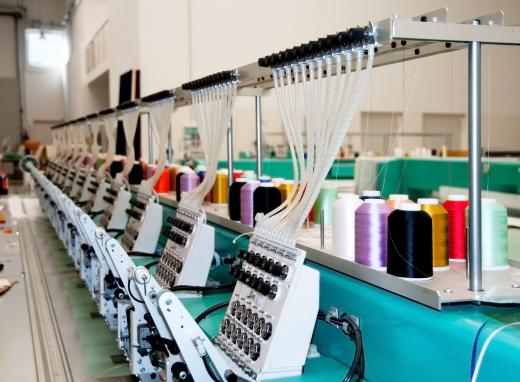Commercial embroidery is the mass-production of embroidered finishes on garments, sheets, and other textile products. The equipment used in this industry is usually capable of creating large volumes of embroidered projects, including customized projects, at very high speed. Computer programs are often used to control the equipment and input commands, and many use interfaces designed to be friendly for people who are not necessarily familiar with programming. Companies can contract out embroidering services or purchase their own machines for in-house work.
Some producers of textiles need embroidery services for their product lines, ranging from floral details on shirts to embroidered tags for sheets. These companies integrate commercial embroidery into their production process, and may have facilities that handle embroidering to cut expenses associated with shipping projects out. Other firms offer customization as a service to clients, including retailers and direct consumers, and offer it as part of complete product packages for customers.

Retailers can order embroidered garments like shirts customized with business names, organization logos, and other details. Individuals may request monograms for sheets and towels, novelty shirts, and other projects. In this case, the commercial embroidery specialist works with the client to determine the nature and scope of the project, and provide a bid. Some retailers have their own equipment for embroidering, and may offer services while customers wait like customization of sports gear.

Large-scale embroidering can require the coordination of complex, multicolored designs with a number of different needs. Consultants can assist clients with the development of projects, and may discuss limitations like size and color restrictions that could impact the final price of the project. This can include the provision of samples made from files provided by the client, to allow people to see how a finished project will look. If a commercial embroidery company cannot handle a project because of special needs like size or a limited timeline, it may be able to refer customers to another provider.
Costs for commercial embroidery equipment can vary depending on make, size, and model. Starter kits are available for settings like storefronts that want to provide embroidery to clients along with tailoring and other customization services. Larger models for industrial production are much more expensive and may require special training for operators. They are typically fully programmable and may come with features like the ability to save patterns for repeat use in the future and handling of multicolored or especially complex designs.
Ever since she began contributing to the site several years ago, Mary has embraced the exciting challenge of being a About Mechanics researcher and writer. Mary has a liberal arts degree from Goddard College and spends her free time reading, cooking, and exploring the great outdoors.

